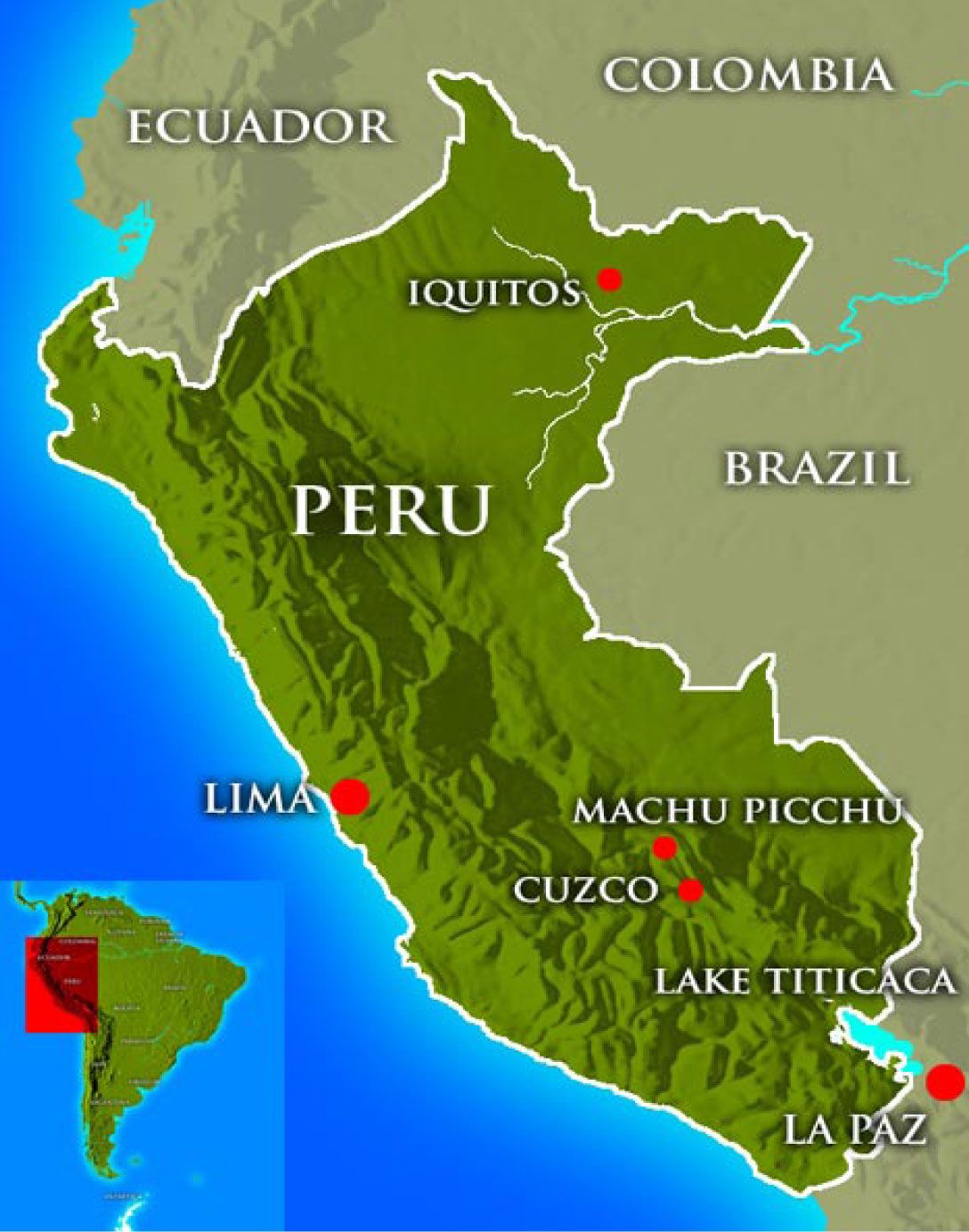Wednesday, September 23, 1988.
I headed for the airport with my old Army duffel bag filled three-quarters full with clothing for hot weather and cold. My passport, tickets, and other papers were all in order. I had flights with connections in Atlanta and Miami, and my only concern was delays.
The switch at Atlanta was smooth, but on the way to Miami, the pilot announced that storms were ahead. We flew down to Key West, then about 150 miles east out over the Atlantic, before we swung around for our approach to Miami. We landed at 6 p.m., the departure time of my flight to Lima, but the storm had delayed everything. My plane didn't depart Miami until 10:00.
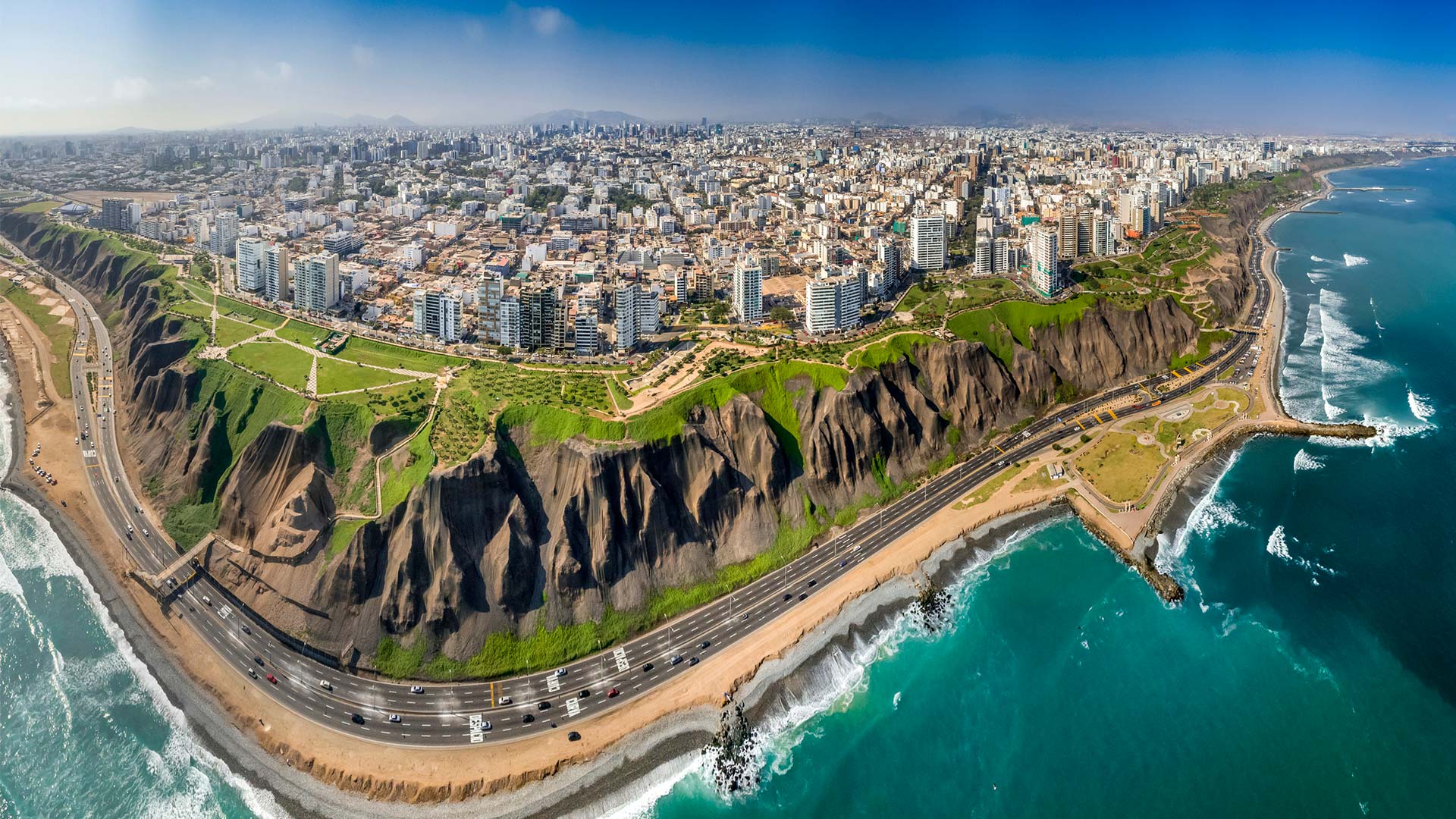
Lima, Peru. Source of photo: Internet.
Thursday, September 24, 1988.
In Lima, when I got through Customs, I changed some money (Peru nationalized the banks shortly before my trip, so no currency exchange was possible outside the country), got a cab (we were stopped by the police for a spot check along the way), and finally got to my hotel. It was 4 a.m. Miami time. Without Daylight Savings Time, it was 3:00 in Peru, and that gave me only an hour and a half of sleep before I had to get up and catch a ride back to the airport for my flight to Iquitos. It landed there around 8 a.m.
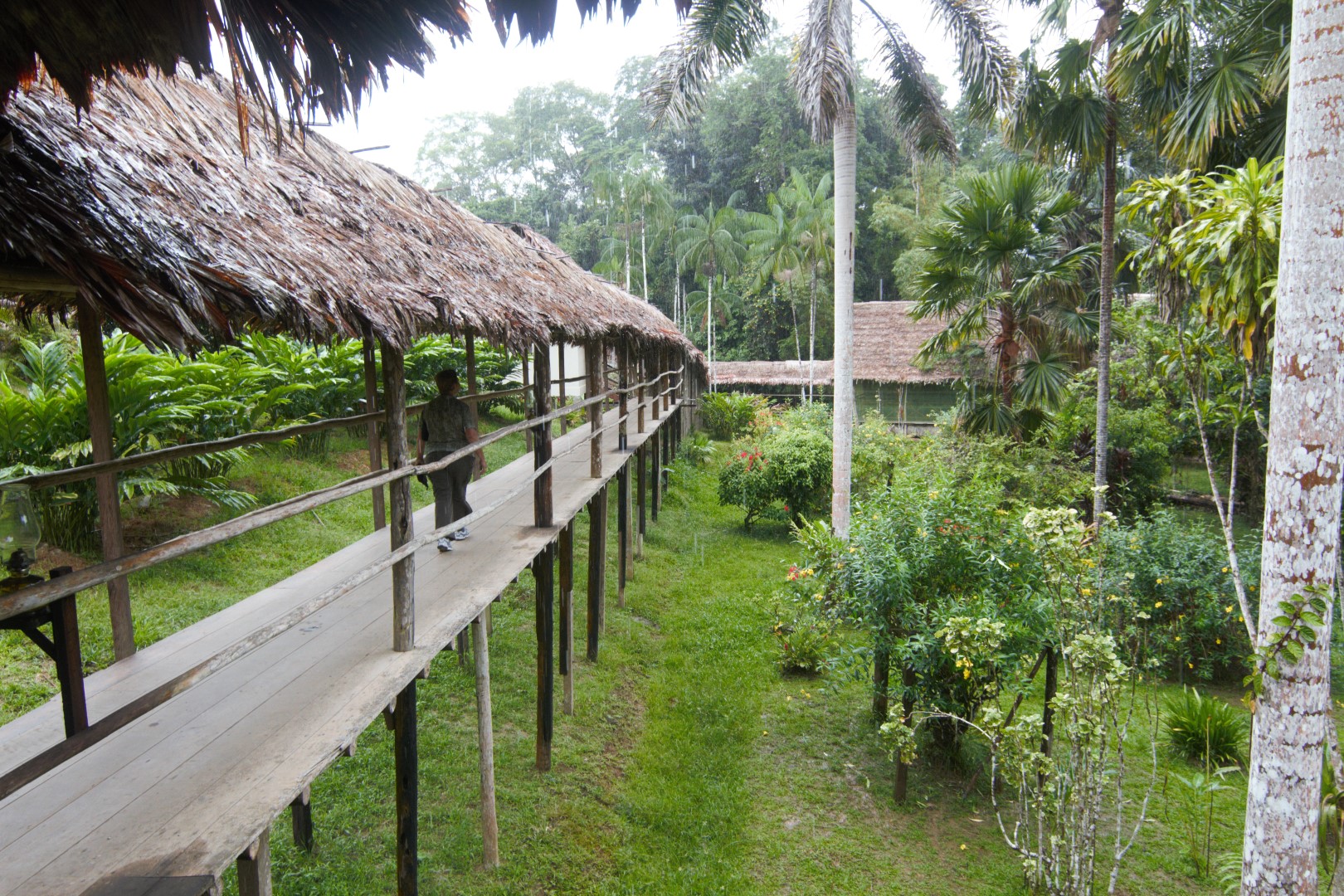
Explorama Lodge. Source of photo: Internet.
Friday, September 25, 1988.
I met Menola, my guide, at the terminal and we took a brief, bumpy tour of the city. After a short wait, we boarded a long, narrow, covered boat with outboard motor for the fifty-mile trip down the Amazon River to Explorama Lodge. Aboard were a half dozen of so other people, some drums of gas or kerosene, and food supplies. The only way for people and supplies to reach the lodge is by boat.
Although 1500 miles from the mouth of the river, the Amazon at Iquitos is quite wide, maybe a half-mile or so, and the current is strong. It is brown water with trees and other debris floating along. The sun was bright and hot, and the trip was very enjoyable in spite of my lack-of-sleep headache.
Menola explained that since the water was low (water levels vary forty feet or more between wet and dry seasons!), we would have to climb up the bank of the river and walk several hundred yards to the lodge. In the rainy season, the boat takes you right there!
What a delight to find I was the only guest, so Menola was in effect my own personal guide. Assigned Room #1, I went to take a look. There were window openings, but no glass or screens, so bugs and other animals can come and go as easily as the guests.
At lunch, I mentioned to Menola that I was surprised to see bats hanging from the rafters. Menola was apparently a little surprised, too, because my room was quickly changed to #9 (it seems mosquito-netting protection isn't sufficient to guard against bat bites).
Lunch, like all the meals, was very basic: vegetables, rice, bread, fruit, and a main dish or fish or chicken. The dining room was also basic, but it had screening all around, thank goodness! After I had a brief rest, Menola took me for a walk. He mentioned that half of the structures at the lodge will be taken down soon because they are located on land that floods during the rainy season. Water marks above floor level were quite noticeable. Menola said high water was only one of the problems. When the land floods, lots of snakes take refuge in whatever remains above water, like the rooms, shower building, outhouses, and covered walk ways. I decided that would be wise to place my duffel bag on the bed inside the mosquito netting.
Starting out on our walk, I almost stepped on a trail of fire ants. (If they crawl on you, they'll bite, with painful results.) Along the way we saw an Indian school, several "homes" (not much more than covered platforms built on stilts), some natives planting corn, a still, and many jungle trees and plants. My headache was intensifying by the time we got back to the lodge and the sun had set (snaked come out when it gets dark and even Menola admitted concern, since he was wearing single-strap sandals).
Supper was served at 7:30, and afterward I was ready for bed. Kerosene lanterns provided dim light on the path back to my room and there were many animal sounds emanating from the blackness.
A single lantern in the middle of the floor was barely enough to illuminate the outhouse, but I had my little flashlight with me. Shining it around before I left, I noticed a tarantula crawling on the wall no more than three feet from where I had been standing.
I entered my tiny mosquito-netted world and just barely found space for myself, in addition to my duffel bag, camera bag, boots, and other belongings. It was warm in the netting, but it cooled down at night and I was glad to have a blanket. I left the kerosene lamp on all night. I was very tired and slept soundly.
The next morning I wanted to take a shower, but was reluctant to do so because the water was taken directly from the Amazon. I had been warned about the water because it's laced with parasites. Natives swim in it and although their systems are somewhat immune, they sometimes get disease and bloated stomachs. I decided to use the "moist towelettes" I had brought along, so there I was squeezed in my mosquito-netting trying to wash myself with tiny, hardly-wet, paper patches six inches square.
Brushing my teeth was another dilemma. I didn't for the first day or two, but then couldn't stand my pasty, sticky, awful-tasking mouth. I decided to brush with no water; not a particularly recommended procedure, but at least I could then live with my mouth.

Source of photo: Internet.
Saturday, September 26, 1988.
After breakfast, we started out in an uncovered boat for a trip along the Amazon and up the Manati River. We had packed a lunch. It was marvelous, even though the boat's motor sounded like it was going to expire at any moment (it did conk out a couple of times). Noise from the propeller would sometimes frighten entire schools of sardines to leap up into the air. Once a fish jumped out of the water right into our boat.
We saw the jungle from the river and saw lots of people and their huts along the way. Men were fishing with nets, women were washing clothes, children were jumping and splashing in the water. The Amazon River is their life. They drink from it; find their food in it; wash their dishes, clothes, and themselves in it; and use it as a community septic system.
Along one of the many tributaries to the Amazon, we turned off the engine and sat for a moment to enjoy the beauty of the scene. Mangrove trees were all about. Birds were singing and the sun was bright and warm. Menola suggested we fish for piranha. He put some red meat on a hook and quickly pulled in a little one. It made a strange sort of grunting sound as it flopped about in the bottom of the boat. Menola was careful not to let his bare feet get too close to the jaws of the fish. When I had a chance to throw in a fishing line (it was only about four feet long and it had a metal wire on the end so the piranha can't bite through), it wasn't long before I felt a tug, I pulled up the line quickly. There was a piranha hanging on the end, but before I could get him in the boat, he let go and splashed back in the water. I knew I had to pull the fish up and swing the line over into the boat at the same time, but I couldn't get the knack.
On one try, I got a big nibble and I pulled hard on the pole to flip him in the boat. It wasn't a piranha at all, but was a big fish (maybe 14 inches or so) and Menola give an excited shout of encouragement. In my enthusiasm, however, I flipped him out of the water, all the way across the boat, and back into the water on the other side, where he promptly jumped off the line to freedom. Although we caught several piranha and catfish, for the rest of the day, neither of us saw anything like that one I let get away. (We took the piranha we did catch back to the lodge where we ate them for supper.)
Lunch, eaten on the boat, was chicken, cucumbers, and such prepared by Menola and another guy with us from Explorama. They carefully washed their hands and a big machete knife in the river before they prepared our meal. I also had a Coke, but refused the watermelon that they handled with less than thorough sanitary care (in my view).
That night, I was treated to some music sung any played by three lodge employees prior to supper. After the meal, I headed right to bed, but worke up in the middle of the night to a chorus of jungle noises, the most unnerving of which was a crunching sound, a very loud and close crunching sound, like a big animal chewing a smaller animal. I tried to shine my little flashlight through the netting, but couldn't see anything. The crunching continued, but there no way to see what it was without getting out of my netting, and there was no way I was going to do that! I never found out what the crunching was.

Source of photo: Internet.
Sunday, September 27, 1988.
Today, we had a walk through primary jungle. There were gigantic trees, long snarled vines, many tarantulas, some poisonous frogs, and so many plants, flowers, and growing things. We met some Indians on the paths and visited a village where we saw natives dressed in their old, traditional grass skirts (just for tourists). It was thoroughly enjoyable.
After lunch, we packed and headed up river to Explorama Inn, a 25-mile boat trip. The inn isn't quite as rustic as the lodge. I had my own cabin with screening all around. Unfortunately, however, there was a gap under the door, and I discovered an army of ants had made a path into my accommodations, around in a nice loop, and back out again.
In the late afternoon, we had time for another boat ride and walk to Santa Victoria Lake. There we saw lily pads two to three feet in diameter! We also did some more piranha fishing, but didn't have much luck. Back at the inn, Menola showed slides of interesting local sights and also told about the boa constrictor that lived above the dining room. Rats were crawling all over the place, he explained, before the boa took up residence. Since then, there have been no signs of rats at all.
After a good supper, I headed back to my cabin. The walk was poorly lit and I thought I saw something move. Shinging my flashlight down at my feet, I saw I had almost stepped on a tarantula -- a great big tarantula -- six inches in diameter! I let out a loud yelp.
I was glad to get inside my screened-in room, but disappointed to discover some other things were in there, too: a huge beetle (must have been two inches long), a grass hopper, a three-inch spider, an ordinary bug, and a tiny frog. I was tolerant of the frog (it was in the bathroom, but there was no door to isolate it there), but I didn't like the other wildlife, so I set about to trap or remove the creatures. The grass hopper was easy. I flipped an ash tray over him and let his be. The ordinary bug was squashed in an ordinary way. The beetle and spider were another matter, however, for they were too big to squash as far as I was concerned, and they were too quick to readily capture. I worked an hour and a half on those critters before I was able to trap the beetle and flush him down the toilet and then after much stalking and frustration, in a fit of rage, I smashed the spider with my boot.
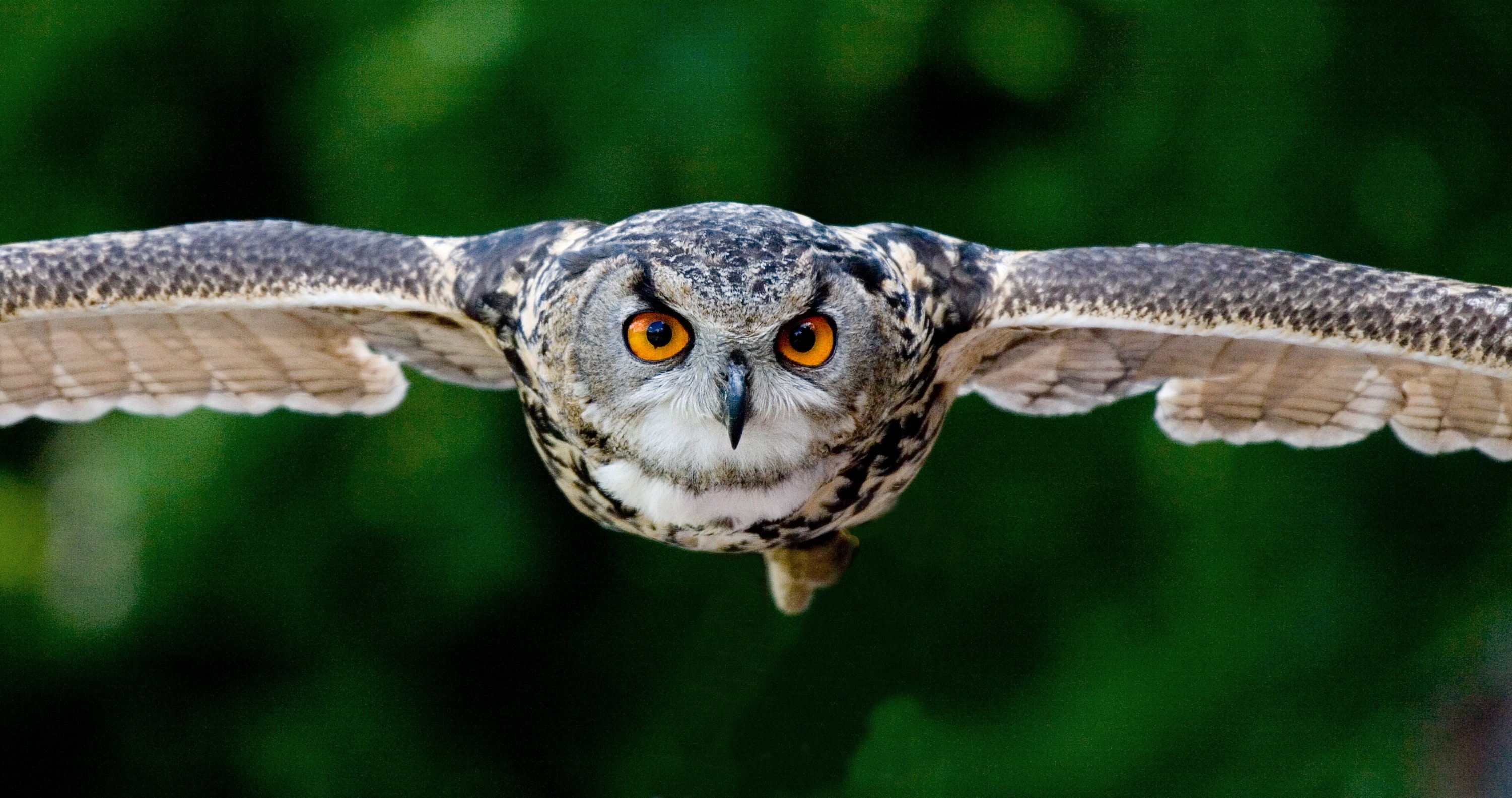
Source of photo: Internet.
Monday, September 28, 1988.
The jungle walks were such a treat. There's so much to see. You could stand in one spot and watch the jungle life for hours. Walking along keeps you very busy. We apparently frightened an owl we didn't see, and it swooped down with maybe a three-foot wingspan and flew off through the foliage. I didn't know how so large a bird could navigate so nimbly through all the trees and vines.
At 1:30, the boat was ready to take me 25 miles back up the river to Iquitos and the end of my Amazon adventure. We were at the airport an hour before flight time, but our promptness was unnecessary, as the flight was delayed two and a half hours. I got to my Lima hotel at 11 p.m.
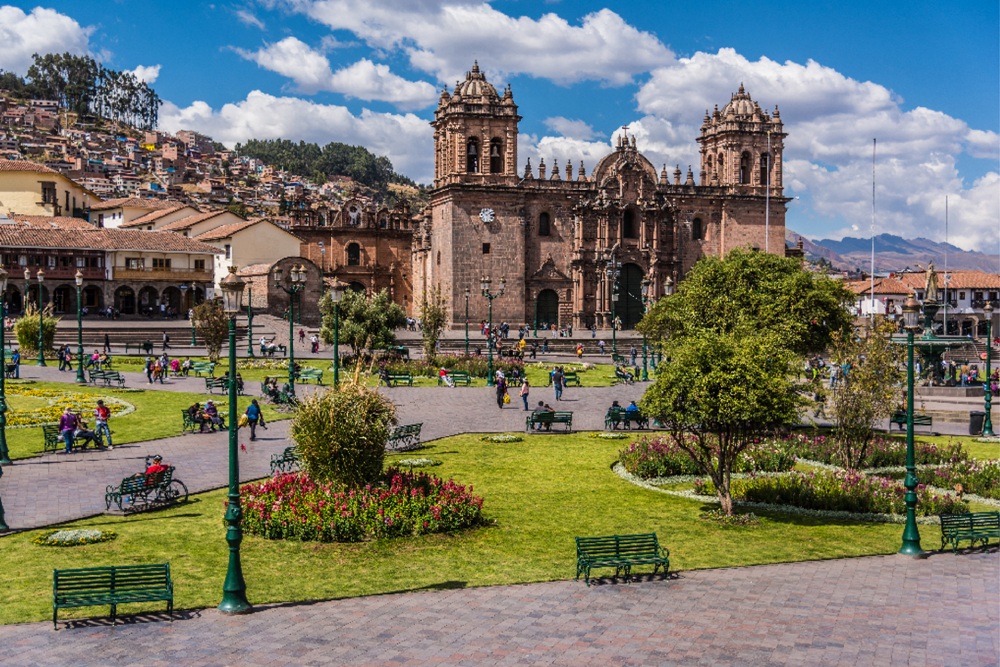
, Peru. Source of photo: Internet.
Tuesday, September 29, 1988.
Up at 4 a.m., I was thankful to have a good, warm shower and to be able to shave for the first time on the trip. I met my contact at 5:10 for the short drive back to the airport. I caught an early flight and was at the El Dorado Inn in Cusco, Peru by 9 a.m. Having heard horror stories about altitude sickness (Cuzco is 11,200 feet high), I made sure I drank some coca tea (made from the same leaf that produces cocaine) and got some rest.
Since I had heard (from tourists, while I was on the Amazon) that a cup of coca tea and an hour's rest should greatly ease or completely prevent altitude sickness, I thought I'd really be safe with three cups of tea and three hours of sleep. But I was wrong. In the afternoon, there was a very interesting city tour (cathedrals, first good look at llamas and the native people, and lots of Inca buildings), but by evening, I felt really discombobulated, like I was trying to adjust to a big time-zone change.
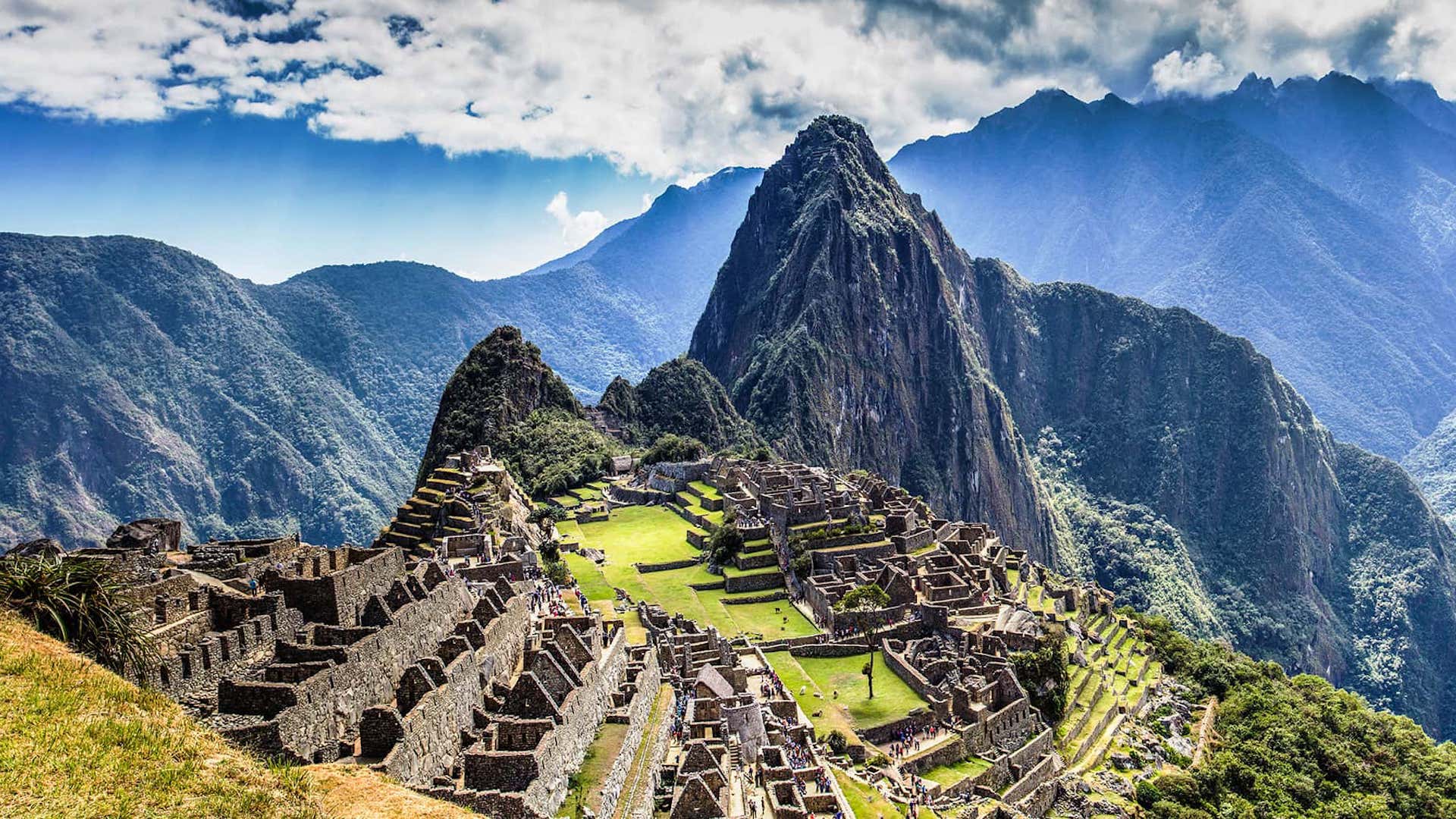
Machu Picchu. Source of photo: Internet.
Wednesday, September 30, 1988.
The next morning I was still dragging. Up at 6:00, I met my guide at 6:30 and was on the train for Machu Picchu by 6:45. During the three-and-a-half hour ride, my headache worsened, as did my nausea. I sat nearly motionless for most of the trip. By the time the train reached the station at Machu Picchu, I had a fever and diarrhea. I joined the tour group for the bus ride up the mountain (another 2000 feet in elevation, including 14 hairpin curves), but then had to leave the group immediately to find a rest room. I walked around a little on my own and even took a couple of pictures, but I felt absolutely miserable. Back on the train, I drank a Coke, downed a Lomotil, and fell asleep for a half-hour or so. (I skipped lunch.)
Back at the El Dorado Inn in Cusco, I still wasn't feeling so good. With chills, general aches, and chest pains, I went to bed without supper.
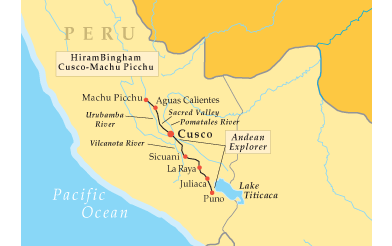
Train route from Cusco to Puno. Source of photo: Internet.
Saturday, October 1, 1988.
Up at 6:30, I wasn't feeling any better. I had three delicious glasses of orange juice, two crackers, and one Lomotil, and was at the train station at 7:45. It was an interminable ride. I sat in a seat that faced backwards and I dozed on and off for the entire ten-and-a-half hour ride. I felt like a zombie.
Once I got the Juliaca, I still wasn't at my destination for that day. I got on a mini-bus and traveled another hour and a half to Puno and the Hotel Tambo Titicaca. I knew I should eat something, since I hadn't had much of anything for almost two days, so at the front desk I asked for some food. Or I should say I tried to ask for food. I couldn't speak Spanish and the man at the hotel desk couldn't speak English. I was finally able to communicate my wishes and was brought a bowl of tomato soup. It was really good.
Still in a daze, I tumbled into bed and fell asleep. A short time later there was a knock on the door. I dragged myself out of bed to see who was there. It was the hotel manager. He had brought me a green hot-water bottle. How very thoughtful! I bundled up all the blankets I could and cuddled up with my green hot-water bottle and drifted off to sleep again. I particularly appreciated the extra heat source as the power went out during the night and the heater in the room was useless. And it was cold!
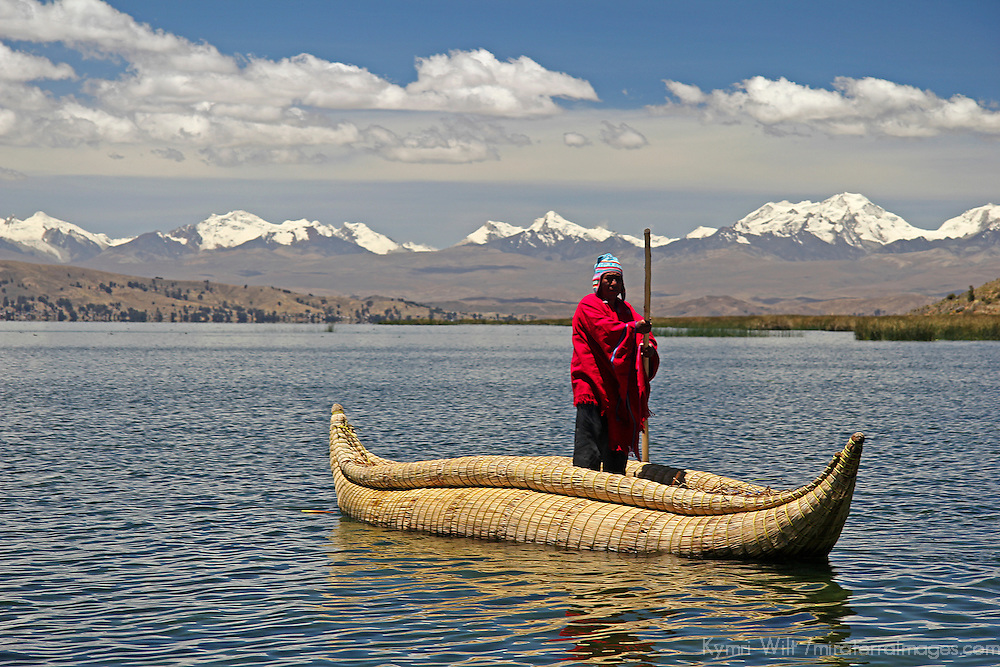
Lake Titicaca. Source of photo: Internet.
Sunday, October 2, 1988.
My schedule was easier this morning and I was able to sleep in a little. Breakfast wasn't until 8:30. A sign on the bathroom wall said, "Run tap 10 minutes to get warm water," but I didn't feel like taking a shower anyway. I still felt pretty rotten. Breakfast was some kind of juice mixed up in a blender accompanied by a cup of tea. And Tylenol. And Lomotil.
I was out at the road awaiting my pickup, and hoping the trip would end soon. It was 9:30, then 9:45, then 9:55. There was very little traffic on the two-lane road. I began to wonder if I had been forgotten. I went bback to the hotel to call the tour people, but after a feeble conversation concluded that the hotel had no telephone. If indeed I had been forgotten, how would I ever get back home? I couldn't imagine.
The car for me arrived at 10:15. The tour man apologized (I think that's what he was doing), but I was just glad to be on my way again. It was an hour's drive to the hydrofoil.
I exchanged all my Peruvian currency with an old lady who produced a large roll of Bolivian currency from under her dress. I assumed that the tour man was keeping her honest.
The weather was marvelous. A big, warm sun shone down on the beautiful waters of Lake Titicaca. It's the highest navigable lake in the world (12,580 feet), and I thought to myself as I skimmed across it: I'm higher than the peak of the Mount Fuji in Japan. I wrote in my log: "I'm beginning to feel human again." Better than that, I began to feel good!
The water was clear and the scenery was wonderful. We had boarded the boat at Juli and our first stop was Copacabana, Bolivia. (Passport processing in Puna was apparently the cause of my delayed pickup.) I was part of a tour of a dozen or so Germans, and the tour guide spoke German most of the time, but I didn't really care. I was well again, and so thankful to be well again.
We briefly toured Copacabana, walked through the famous cathedral there, and stopped at a small, old, and dirty hotel for lunch. Some of the things served looked strange, but I was hungry, so I ate, but somewhat cautiously.
A second stop was Sun Island (the Inca Empire was founded there, according to legend), where we climbed up the steps to see the Inca Water Spring (said to be the source of eternal youth) and the dramatic view of the lake. It's a tough climb when you're starting at 14, 580 feet. (Or it was for me.)
Then a hydrofoil took us to Huatajata, the home harbor of the hydrofoil tour boats. There we saw natives paddling their reed boats and looked through a small museum. Then we boarded a bus for the hour's ride to La Paz. It was rush hour in the city and the roads were jammed. People were lined up blocks long for busses to take them home. It was a big city, but still with such poverty and poor living conditions. there's only one four-land highway. It runs about five miles from the airport into town. Many of the city roads are still unpaved.
My stay in La Paz was very brief. I had probably less than an hour to look through the stops at the Sheraton Hotel before I had to catch a cab to the airport for my flight home. It was disappointing to have so few opportunities to buy souvenirs. There were few chances to get post cards, too, but I was told most postcards don't get out of the country (people steam off the stamps and throw away the cards). At the airport I did find a few shops open and had 45 minutes or so to buy things. One purchase was a series of panels -- each about 15 inches square -- all woven together end to end. (After I got home, I cut them apart and I've had them on my wall ever since.)
The flight home was rather uneventful. La Paz is at such a high altitude, planes can't take off with full loads of fuel (even though the runway is four miles long!), so all flights are short hops to other airports at lower altitudes where normal fueling can take place. Our hop was back to Lima, where refueling didn't take long at all, but we couldn't depart when the fuel tanks were full, because time was needed, the captain told me, for the plane's brakes to cool down after our landing. No plane is permitted to fly unless its brakes have completely cooled, and that took close to an hour, if I recall correctly.
Once we were on our way, I read a little and slept a little and then noticed we were landing in Panama City to discharge and pick up passengers. Then, we flew on to Miama. Then, on to Atlanta. Then, finally, a flight to Raleigh and a drive back home. (I was living in Cary, North Carolina at the time.)
I found my altitude sickness had left me susceptible to a cold, which I promptly caught when I got home. I also found that in the last day or two of the trip I was recipient of a series of bug bites, just around my ankles, and 50 to 75 of them itched like crazy. When they kept me awake for a couple of hours one night, I decided I needed to take action. I tried alcohol swabs, Hydro cortisone, and Benadryl, all without any success, at least as far as I could tell.
Nevertheless, was truly a fantastic trip. The Amazon was the highlight, but Machu Picchu would have been a highlight if altitude sickness had not been a factor. My adventure was thrilling, mysterious, awesome, and thoroughly enjoyable. However, I'm not quite ready for another visit there. I haven't yet fully recovered from this one!
 The way back home. The way back home.
|
